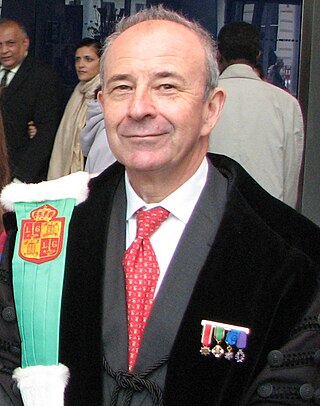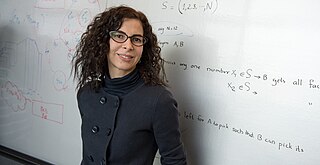Related Research Articles

The Huazhong University of Science and Technology is a public university in Wuhan, Hubei, China. It is affiliated with the Ministry of Education of China. The university is part of Project 985, Project 211, and the Double First-Class Construction.

David A. Bader is a Distinguished Professor and Director of the Institute for Data Science at the New Jersey Institute of Technology. Previously, he served as the Chair of the Georgia Institute of Technology School of Computational Science & Engineering, where he was also a founding professor, and the executive director of High-Performance Computing at the Georgia Tech College of Computing. In 2007, he was named the first director of the Sony Toshiba IBM Center of Competence for the Cell Processor at Georgia Tech.

Rosalind Wright Picard is an American scholar and inventor who is Professor of Media Arts and Sciences at MIT, founder and director of the Affective Computing Research Group at the MIT Media Lab, and co-founder of the startups Affectiva and Empatica.

Jacek M. Zurada is a Polish engineer who serves as a Professor of Electrical and Computer Engineering Department at the University of Louisville, Kentucky. His M.S. and Ph.D. degrees are from Politechnika Gdaṅska ranked as #1 among Polish universities of technology. He has held visiting appointments at Swiss Federal Institute of Technology, Zurich, Princeton, Northeastern, Auburn, and at overseas universities in Australia, Chile, China, France, Germany, Hong Kong, Italy, Japan, Poland, Singapore, Spain, and South Africa. He is a Life Fellow of IEEE and a Fellow of International Neural Networks Society and Doctor Honoris Causa of Czestochowa Institute of Technology, Poland.

Sami Erol Gelenbe, a Turkish and French computer scientist, electronic engineer and applied mathematician, pioneered the field of Computer System and Network Performance. Currently Professor in the Institute of Theoretical and Applied Informatics of the Polish Academy of Sciences, he is also an Associate Researcher in the I3S Laboratory and Abraham de Moivre Laboratory. Fellow of several National Academies, he Chairs the Informatics Section of Academia Europaea since 2023. His previous Professorial Chairs include the University of Liège (1974-1979), University Paris-Saclay (1979-1986), University Paris Descartes (1986-2005), NJIT (1991–93), ECE Chair at Duke University (1993-1998), University Chair Professor and Director of EECS, University of Central Florida (1998-2003), and Dennis Gabor Professor and Head of Intelligent Systems and Networks, Imperial College (2003-2019).
Min Chen is a professor in the School of Computer Science and Technology at Huazhong University of Science and Technology (HUST). His research focuses on Big data, Internet of Things, Machine to Machine Communications, Body Area Networks, Body Sensor Networks, E-healthcare, Mobile Cloud Computing, Cloud-Assisted Mobile Computing, Ubiquitous Network and Services, Mobile Agent, and Multimedia Transmission over Wireless Network, etc. He has been an IEEE Senior Member since 2009.

Mohammad Salameh Obaidat is a Jordanian American Academic/ Computer Engineer/computer Scientist and Founding Dean of College of Computing and Informatics at the University of Sharjah, UAE. He is the Past President & Chair of Board of Directors of and a Fellow of the Society for Modeling and Simulation International (SCS), and a Fellow of the Institute of Electrical and Electronics Engineers (IEEE) for contributions to adaptive learning, pattern recognition and system simulation . He was born in Jordan to The Obaidat known Family. He is the cousin of the Former Prime Minister of Jordan, Ahmed Obaidat and received his M.S. and Ph.D. in computer engineering from the Ohio State University, Columbus, Ohio, USA. He is known for his contributions in the fields of cybersecurity, Biometrics-based Cybersecurity, wireless networks, modeling and simulation, AI/Data Analytics. He served as President and Char of Board of Directors of the Society for Modeling and Simulation International, SCS, a Tenured Professor & Chair of Department of Computer Science at Monmouth University, Tenured Professor & Chair of Department of computer and Information Sciences at Fordham University, USA, Dean of College of Engineering at Prince Sultan University, and Advisor to the President of Philadelphia University for Research, Development and IT. He has chaired numerous international conferences and has given numerous keynote speeches.
Jayant R. Haritsa is an Indian computer scientist and professor. He is on the faculty of the CDS and CSA departments at Indian Institute of Science, Bangalore, India. He works on the design and analysis of Database Systems. In 2009 he won the Shanti Swarup Bhatnagar Prize sponsored by CSIR, India. In 2014 he won the Infosys Prize for Engineering.
Mary Jane Irwin is an Emerita Evan Pugh Professor in the Department of Computer Science and Engineering at Pennsylvania State University. She has been on the faculty at Penn State since 1977. She is an international expert in computer architecture. Her research and teaching interests include computer architecture, embedded and mobile computing systems design, power and reliability aware design, and emerging technologies in computing systems.

Farinaz Koushanfar is an Iranian-American computer scientist whose research concerns embedded systems, ad-hoc networks, and computer security. She is a professor and Henry Booker Faculty Scholar of Electrical and Computer Engineering at the University of California, San Diego.

Dina Katabi, born 1970, is the Andrew and Erna Viterbi Professor of Electrical Engineering and Computer Science at MIT and the director of the MIT Wireless Center. She was designated as one of the world’s most influential women engineers by Forbes magazine.

Chai Keong Toh is a Singaporean computer scientist, engineer, industry director, former VP/CTO and university professor. He is currently a Senior Fellow at the University of California Berkeley, USA. He was formerly Assistant Chief Executive of Infocomm Development Authority (IDA) Singapore. He has performed research on wireless ad hoc networks, mobile computing, Internet Protocols, and multimedia for over two decades. Toh's current research is focused on Internet-of-Things (IoT), architectures, platforms, and applications behind the development of smart cities.

A B M Shawkat Ali is a Bangladeshi origin-Australian author, computer scientist and data analyst. He author of several books in the area of Data Mining, Computational Intelligence, and Smart Grid. He is a newspaper columnist. He is an academic and well-known researcher in the areas of Machine Learning and Data Science. He is also the founder of a research center and international conferences in Data Science and Engineering. He is now an Adjunct Professor in Data Science in the School of Engineering and Technology, Central Queensland University, Australia.

David Atienza Alonso is a Spanish/Swiss scientist in the disciplines of computer and electrical engineering. His research focuses on hardware‐software co‐design and management for energy‐efficient and thermal-aware computing systems, always starting from a system‐level perspective to the actual electronic design. He is a full professor of electrical and computer engineering at the Swiss Federal Institute of Technology in Lausanne (EPFL) and the head of the Embedded Systems Laboratory (ESL). He is an IEEE Fellow (2016), and an ACM Fellow (2022).
Stefano Soatto is professor of computer science at the University of California, Los Angeles (UCLA), in Los Angeles, CA, where he is also professor of electrical engineering and founding director of the UCLA Vision Lab.
Daniel P. Siewiorek is an American computer engineer and computer scientist, currently the Buhl University Professor Emeritus of Electrical and Computer Engineering and Computer Science at Carnegie Mellon University.
Vir Virander Phoha is a professor of electrical engineering and computer science at Syracuse University College of Engineering and Computer Science.
Joshua R. Smith is an American computer scientist and electrical engineer and a professor at the University of Washington. He is known for research on wireless power, backscatter communication, and robotic manipulation.

Wei Gao is a Chinese-American biomedical engineer who currently serves as an assistant professor of medical engineering at the California Institute of Technology (Caltech). Gao has been a professor at Caltech since 2017 and is an associate editor of the journals Science Advances, npj Flexible Electronics (Nature), Journal on Flexible Electronics (IEEE), and Sensors & Diagnosis.
Enrique Herrera Viedma is the Vice-Rector for Research and Knowledge Transfer at the University of Granada (UGR), Spain. He is also Professor in Computer Science and Artificial Intelligence at the same university since 1994.
References
- 1 2 3 "Giancarlo Fortino". Laboratory of Smart, PErvasive and Mobile systems Engineering (SPEME). 2022-05-22. Retrieved 2022-05-22.
- ↑ "Giancarlo Fortino - ICAR-CNR". CNR (in Italian). 2022-05-22. Retrieved 2022-05-22.
- ↑ "OCIBE Page of Giancarlo Fortino". OCIBE - Overseas Chinese International Biomedical Engineering. 2022-05-22. Retrieved 2022-05-22.
- ↑ "IEEE Press Book Series on Human-Machine Systems". IEEE Press. 2022-05-22. Retrieved 2022-05-22.
- ↑ "Editorial Board of Springer Book Series on "Internet of Things: Technology, Communications and Computing"". Springer. 2022-05-22. Retrieved 2022-05-22.
- ↑ "Wearable Computing: From Modeling to Implementation of Wearable Systems based on Body Sensor Networks". Wiley. 2022-05-22.
- ↑ "Scopus Author's Profile for Giancarlo Fortino". Scopus. 2022-05-22. Retrieved 2022-05-22.
- ↑ "Giancarlo Fortino". Web of Science ResearcherID. 2022-05-22. Retrieved 2022-05-22.
- ↑ "Prof. G. Fortino is nominated Highly Cited Researcher 2021". SPINE Body of Knowledge. 2022-05-22. Retrieved 2022-05-22.
- ↑ "Giancarlo Fortino in IEEE Fellows' directory".
- ↑ "Intelligenza Artificiale - Giancarlo Fortino nominato Fellow della Asia-Pacific Association".
- ↑ "Giancarlo Fortino in AAIA Fellows' directory".
- ↑ "Outstanding SMC Chapter Award". IEEE SMC. 2022-05-22. Retrieved 2022-05-22.
- ↑ "IEEE Sensors DSP".